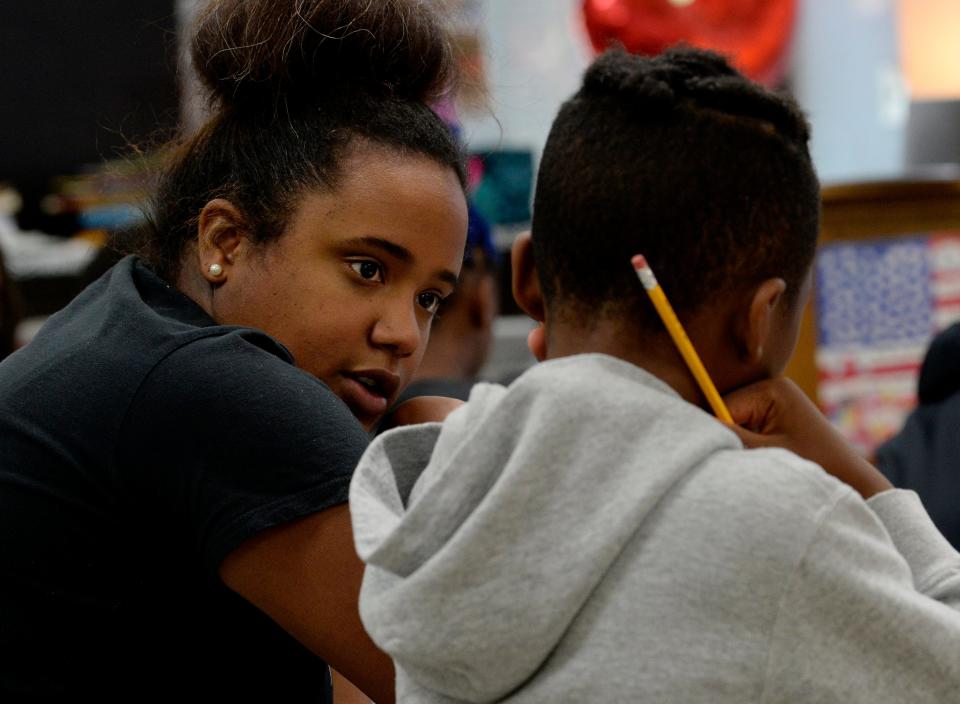Only 1.2% of Tennessee third graders held back after reading law rollout. Here's why
Just 1.2% of public school third graders were held back after a controversial reading and retention law took effect in Tennessee this year.
In May, the Tennessee Department of Education reported that 60% of third graders in the state's public schools fell short of a reading proficiency benchmark on the standardized Tennessee Comprehensive Assessment Program test. That worked out to around 44,000 of the state's nearly 74,000 third graders enrolled in the 2022-23 school year.
Ultimately, just 898 third graders were retained, according to a report from the Tennessee Department of Education on Monday.
But the 60% figure did not factor in exemptions for students with disabilities or suspected disabilities that may impact their reading, students who are still learning English and those who were held back in a previous grade. Exemptions were up to the districts to sort out.

The state also offered multiple other options for students to move on to fourth grade, including test retakes, summer school, tutoring and an appeals process.
Here's a look at how many students fell into each category, based on the report, which reflects data submitted to the department as of Sept. 13.
'Not a reading proficiency test': TN parents, experts question TCAP use in third grade law
How Tennessee third graders moved on to fourth grade
Third graders had to score as "met" or "exceeding" expectations on the English language arts section the TCAP to be automatically promoted to fourth grade. If they scored "below" or "approaching" expectations, they had several options to avoid being held back.
The largest block of third graders — around 16% of those facing retention — moved on to fourth grade by qualifying for and enrolling in free, year-long tutoring for the 2023-24 school year. The next largest block was made up by students who were exempt due to a disability or suspected disability that impacts reading, coming in at 14.2%. Parental appeals were third on the list, representing 9.56% of third graders who were promoted.
Here's how the numbers break down, from largest to smallest.
Qualified for and enrolled in tutoring for fourth grade: 12,056 / 16.13%
Disability or suspected disability that impacts reading: 10,620 / 14.21%
Parental appeal approved: 7,146 / 9.56%
Passed on a TCAP retake: 3,344 / 4.7%
English learner with less than two years of English language arts instruction: 2,712 / 3.63%
Met other exemptions determined locally: 2,314 / 3.1%
Previously held back: 2,119 / 2.84%
Showed adequate growth in summer programming: 1,532 / 2.05%
Of the initial roughly 44,000 third graders who fell short on the spring TCAP, 2,296 were no longer enrolled and 59 were not accounted for, per the department.
There were also 297 students, or 0.4% of third graders, whose attendance rates were not yet reported from summer programming. Those students will be tested to show adequate growth at the end of their fourth grade tutoring. Additionally, 8,086 of the students who are currently enrolled in fourth grade tutoring scored below expectations on the spring TCAP and will be retested for adequate growth at the end of the current school year. The state board of education defined "adequate growth" as a student scoring at least 5 percentage points higher on a post-summer school test than their latest test score.
The Department of Education noted that it counted students in the first pathway for promotion they qualified for, even if they qualified for more than one.
Back to phonics: Tennessee overhauled how it taught reading. There are signs it's working
What's next?
TCAP tests are administered each spring, typically in April and May. Tennessee has several options, including new measures effective starting with the 2023-24 school year, for fourth graders if they fall short on their TCAP English language arts scores.
Automatic exemptions
First, there are several exceptions that allow students to move on to fourth grade without any further actions, including:
English language learners who have received less than two years of English language arts instruction
Those who were held back in a previous grade
Students with disabilities or suspected disabilities that impact their literacy development

Students who scored approaching proficiency
After exemptions are factored in, the remaining children who score below the threshold will be subject to the following guidelines.
Children who score as approaching proficiency must complete one of the following to move on to fourth grade:
Retest and score on grade level during a retest window after the initial TCAP
Enroll in summer school, meet 90% attendance and show adequate growth
Have a free state-provided tutor for the entirety of fourth grade
Tennessee lawmakers also amended the state's reading and retention law to expand options for students who score as approaching proficiency. Starting with the 2023-24 class of third graders, those who also score in the 50th percentile of their most recent state-approved universal reading screening assessment and enroll in tutoring for fourth grade can move on with no further steps.
Students who scored below proficiency
Those who score as below proficiency have the following options to move on:
Retest and score on grade level
Enroll in summer school with 90% attendance rate and have a free state-provided tutor for the entirety of fourth grade
The measurement of "adequate growth" does not apply to students who scored as below proficiency.
Appeals
Parents or legal guardians of students who score as approaching proficiency can also appeal retention decisions over the summer, according to the state education department. Parents can also appeal if students faced hardships during the days leading up to the TCAP.
Starting with the 2023-24 school year, the state will also allow a principal, guidance counselor, teacher or other school administrator to file appeals for students, with written permission from the child's parent or guardian.
Extra tutoring supports
Lawmakers also expanded the state's reading and retention law to require tutoring services for students for an entire school year if they are held back in grades K-3. The measure is effective for the 2023-24 school year onward.
Why Tennessee's third grade retention law is so controversial
The rollout of the third grade reading and retention law, which initially passed in 2021 and took effect for the 2022-23 school year, sparked intense controversy and anxiety among educators, lawmakers, advocates, school leaders and families.
Proponents of the law say it adds free supports for students amid years of lagging literacy rates in Tennessee, aggravated by fallout from the coronavirus pandemic. It came as part of several measures to tackle learning loss from the pandemic. Several other states have enacted similar laws with mixed results in recent years.
Dive deeper: Third grade reading laws are a mixed bag in the US. Here's what other states have learned.
Opponents sharply criticized the law as too narrow and punitive, especially for children so young. The use of the TCAP as the sole measure to determine literacy drew opposition, with parents and educators saying the English language arts section of the standardized test does not actually measure reading proficiency.
Rather, they say the test measures whether a child can analyze and critically think about a text they've read, among other things. Others cited concerns over the fast-paced timeline to decide whether to cancel summer plans and send their child to summer school.
Parents with high-performing children were especially frustrated when their third graders scored in the "approaching" category and were forced to take on summer school or tutoring because they performed poorly on the standardized test. Third grade is the first year Tennessee administers the TCAP for students.
Experts point to universal reading screeners as a much better standard for measuring proficiency. While the law allows for those screeners to be considered in a retention decision, they are not part of the initial measure of proficiency.
This article originally appeared on Nashville Tennessean: Tennessee third grade reading: Data shows how many students held back

